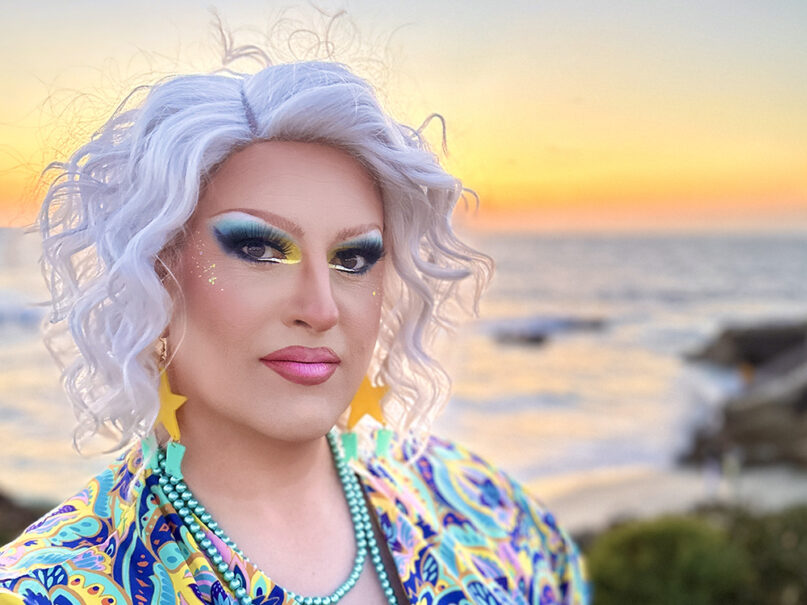Drag queen, Christian artist Flamy Grant joins lawsuit over Tennessee’s anti-drag act
She joins LGBTQ nonprofit Blount Pride in suing a Tennessee district attorney who threatened to prosecute them over a pride event where Grant is scheduled to headline.

(RNS) — Flamy Grant, a drag performer and Christian music artist, has joined an LGBTQ nonprofit in suing a local prosecutor in Tennessee who threatened to prosecute them over a pride event where Grant is scheduled to headline on Saturday (Sept. 2).
“I think it’s an issue of defending our First Amendment rights as artists, queer people and as citizens,” said Grant, the first drag queen to top iTunes’ Christian music charts.
Earlier this week, Ryan Desmond, the district attorney general in Blount County, south of Knoxville, warned Blount Pride in a letter that he intended to enforce the Tennessee Adult Entertainment Act, better known as the “anti-drag act,” if he found any violations of the act at Blount Pride’s festival on Saturday. The festival is slated to present comedy revues, choir concerts and drag performances.
The entertainment act, which prohibits “adult cabaret entertainment” from taking place in public or in a place where it could be viewed by children, passed the state Legislature in February. But in June a federal court ruled that the law is unconstitutionally vague.
Desmond’s letter argues that because that decision is being appealed by the state’s attorney general, Blount County can prosecute violations of the act. The attorney general, Jonathan Skrmetti, is named along with Desmond as a defendant in the lawsuit, as are three Blount County law enforcement officials.
The American Civil Liberties Union filed the lawsuit late Wednesday on the plaintiffs’ behalf, calling Desmond’s letter “a naked attempt to chill Plaintiffs’ speech and expression in retaliation to Blount Pride’s social media posts.”
Grant told Religion News Service after joining the suit, “This is an infringement of the rights of Americans, it is a violation of our personal rights, and it’s just a bad faith, bigoted law, that unfairly targets people based on their sexual identity and orientation, their gender identity, and in my case, their career as a drag queen.”
In an email to local news outlet WVLT news, Desmond said he wrote his letter “simply to give individuals reasonable and fair notice that there is criminal statute that is still in effect in this jurisdiction.” Desmond could not be reached for comment in time for publication.
The lawsuit claims that because the anti-drag law was found unconstitutional based on its legal merits, not just based on facts limited to a particular county, it can’t be enforced anywhere in the state. It argues separately that the law is unconstitutional and that Desmond and his co-defendants sought to restrict plaintiffs’ right to free speech and expression. It also asserts that the plaintiffs have a “reasonable fear” that the law enforcement officials named in the suit will target the event for surveillance and enforcement.
“This law, which specifically targets drag performances, threatens to return the LGBTQ+ community to the days when they had to hide their identity and their art behind blacked-out windows,” the suit says, in requesting an injunction and temporary restraining order to prevent enforcement of the anti-drag law.
As of Thursday evening, the event was still planned for Saturday at Maryville College, a school connected to the Presbyterian Church (USA). Despite the possibility of protests — Desmond’s letter referred to potential “protestors and counter-protestors” — Grant says she’s excited to return to Maryville, a town where last year she held a packed-out concert on one of her favorite stops of her tour.
“I want to support this community, their right to continue to gather and throw a rainbow shindig and have a good time together,” said Grant.
Though the event is not faith-based, a local Episcopal church is one of the sponsors, and Grant’s performances, which feature full-throated folk songs about growing up in the church, are known for their spiritual flair. She told RNS she hopes the lawsuit can debunk the myth that drag is an inherently sexualized art form. It’s a queer art form, she said, one that has as much range as theater or dance.
“Drag is a liberating thing. It shines a light on the ways that we have forced ourselves to fit in boxes that we weren’t meant to fit in,” she said. “And for me, spirituality is all about liberation, it’s calling shame what it is, and calling people into liberation and pride, so they are proud of who they are, and that they know they are worthy and loved. I think drag absolutely can be a spiritual art form.”
No comments:
Post a Comment